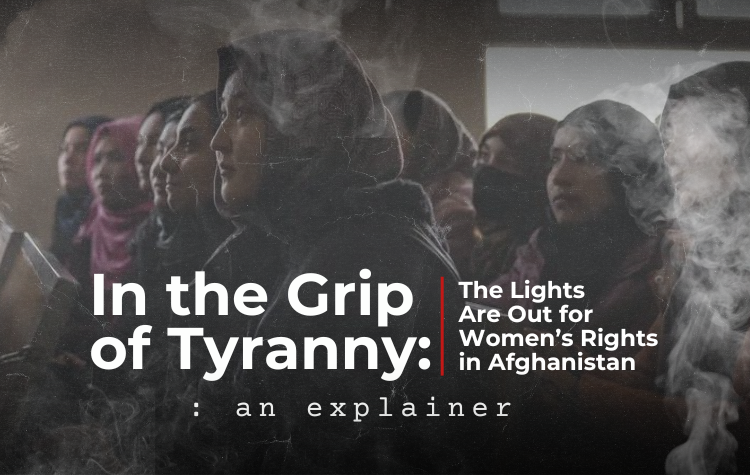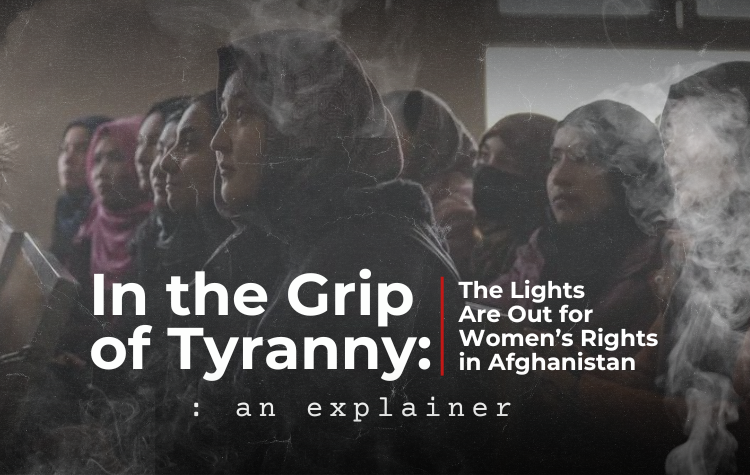
Written by: Muda Tariq, South Asia Programme Fellow, FORUM-ASIA
Women in Afghanistan are up against the wall.
Even in these desolate times, Afghan women have demonstrated extraordinary resilience and courage. They have bravely confronted the Taliban and its anti-women policies; they have refused to be silenced; they have taken to the streets to demand their due rights; and they are making sure to get their stories out.
For far too long, Afghan women have been resisting oppression at the cost of their own lives. Now more than ever, their civic resistance needs support. Words of adoration are not enough, we must take action.
Gender Apartheid
Afghanistan ranked last on the 2022 Global Gender Gap Index.
Through gender apartheid, Afghanistan has re-witnessed the systemic and institutionalized erasure of women from public life. Gender apartheid, as defined by the United Nations, refers to the ‘economic and social sexual discrimination against individuals because of their gender or sex.’
The Taliban have eroded women’s rights, leaving no room for women’s socioeconomic growth. They have normalized gender apartheid.
Afghan women and girls have become the Taliban’s focus of condemnation, yet nothing substantial has been done to support them.
Instead of framing them as passive victims, it is essential to recognize Afghan women as equal agentive stakeholders. They must be given their due place on the high tables of power where their future is deliberated upon. In the recent closed-door UN meetings in Qatar on how to engage with the Taliban, Afghan women were blatantly unrepresented. This exclusion mirrors what the Taliban does best: denying women their agency.
The Taliban’s return to power in August 2021 spelt the end of women’s rights in Afghanistan, backsliding any gains made over the last 20 years. From 2004 until 2021, Afghan women had made significant strides–albeit somewhat limited to urban areas–in terms of education, health, and leadership.
Female enrollment in higher education had increased and women’s life expectancy increased from 56 years in 2001 to 66 in 2017. In 2020, 21 per cent of Afghan civil servants were women, with 16% of them in senior management positions. Meanwhile, 27 per cent of parliamentary members were women.
Despite initial assurances to respect gender equality under the Sharia law, the Taliban spared no time in pushing women and girls back to the margins–curtailing their fundamental freedoms and restricting their access to education, employment, and public spaces.
Previously, the Taliban imposed a regressive interpretation of the Sharia. Now, the Taliban includes more hardliners who see women as second-class citizens. This interpretation of the Sharia is starkly different from other Muslim countries such as Indonesia and Malaysia, where women’s rights are safeguarded and women have somewhat greater access to fundamental freedoms. The Taliban’s reading of Sharia, on the other hand, deprives women of their dignity.
Without concrete actions, we fall into the dangerous trope of using Muslim women to deflect from continued foreign policy disasters that have put them in this situation.
The Taliban’s War on Women
In September 2021, the Taliban ordered women to stay at home as a “temporary procedure,” reasoning that Taliban security forces were not yet trained to speak with women. As a result, the majority of Afghan women were barred from going to work, thereby limiting their ability to support themselves and their families. Soon after, the Taliban ordered schools to reopen only for boys and male teachers, leaving women and girls in the dark.
In December 2021, the Taliban banned women from long-distance travel–any movement of more than 72 kilometres–unless accompanied by a male chaperone known as mahram. In March 2022, the Taliban banned women from flying domestically and internationally without a mahram. The Taliban also disallowed Afghan women from getting medical treatments without a mahram. The Taliban ordered pharmacies to stop selling any form of contraceptives. This is a direct violation of reproductive rights as it puts Afghan women at greater risk of unwanted pregnancies, maternal mortality, and even unsafe abortions, thereby severely impacting their bodily autonomy.
In May 2022, women were ordered to cover up head to toe. Since then, women could only leave their homes if necessary, clad in ‘proper’ attire, and chaperoned by a mahram. In November 2022, the Taliban banned women from entering parks, bathhouses, and gyms. In the same month, public punishments–such as floggings and executions–were reintroduced by the Taliban.
In December 2022, Afghanistan’s Ministry of Higher Education banned women from universities. Peaceful protests were met with brutal whippings and arrests. While protests against the education ban were still reverberating across the country, the Taliban issued a new edict banning women from working for domestic and international non-governmental organisations (NGOs) operating in the country. Subsequently, the Taliban also forbade Afghan women from working for the UN. Reportedly, the Taliban has also detained and harassed Afghan women employed by the UN.
In Afghanistan, women comprised 30% of NGO staff. Without women on their teams, major humanitarian organizations were forced to pause their work, disrupting the delivery of much-needed life-saving services to millions of Afghans–especially since female workers are crucial in communicating with and identifying the specific needs of women and girls. With more than 20 million Afghans experiencing food insecurity and needing humanitarian assistance, the ban on women working with the UN raises significant concerns as it makes responding to the world’s largest humanitarian crisis even more challenging. Millions of Afghans may be pushed down the barrel of famine, death and disease as the latest edict is a breach of the UN charter and it might have to stop its operations altogether.
There have also been reports of forced marriages and violence against women–both physical and sexual–committed by members of the Taliban. The Taliban have erased systems of protection and support for Afghan women escaping abuse, such as the Ministry of Women Affairs, the Afghanistan Independent Human Rights Commission, and the Law on the Elimination of Violence Against Women. With no access to institutions of justice and protection, there has been a surge in death by suicide amongst Afghan women, signalling a spiralling mental health crisis.
Prior to the Taliban takeover, Afghanistan was already a dangerous place for gender minorities and non-conformists. After the takeover, the country’s LGBTIQ+ community has gone into hiding in fear of persecution. The Taliban outrightly disrespects LGBTIQ+ rights, refusing to consider it as a part of human rights.
With the Taliban’s renewed gender apartheid policies, all the progress Afghanistan has made has now been erased. This is a sobering reminder of the fragility of gender rights even in the 21st century.
What We Can Do Now
The international community must recognize the gender apartheid taking place in Afghanistan. There should be an internationally acknowledged definition of ‘gender apartheid;’ otherwise, women’s rights would continue to be undermined in Afghanistan and elsewhere.
Global action is needed in the form of a coordinated and effective policy response.
The international community needs to exert leverage on the Taliban and insist that women’s rights are a non-negotiable priority. It must exert sanctions and put pressure on the Taliban and discourage other countries and international actors from engaging with such de facto authorities.
Cutting off humanitarian aid should not be an option as it will only harm women and children. Donors must include the monitoring of women’s and girls’ rights in their mandates.
Afghan human rights defenders and diaspora have been proactively raising awareness of the Taliban’s abuses and have been running various online and offline campaigns–such as the #MyRedLine, The Feminine Perspective, #LetAfghanGirlsLearn, and #StopHazaraGenocide–across the globe. Such campaigns must be financially supported and amplified.
At an individual level, we must pressurize lawmakers to open safe pathways of migration for Afghan refugees. Denmark and Sweden have granted automatic refugee status to Afghan women and girls, solely on the basis of their gender. This is a noteworthy decision as it recognizes the severe repression of women in Afghanistan and could serve as a model for other refugee-receiving. It is pertinent, however, that safe escort and evacuation must be given priority, including safe houses and gender-based violence services.
We can support Afghan-run online crowdfunding campaigns which require funds to continue their grassroots efforts in helping vulnerable families.
Furthermore, we must support freedom of expression in Afghanistan, recognizing the valuable work of journalists and groups like Rukhsana Media, an Afghan women’s media organisation.
We must protect all human rights defenders (HRDs), particularly women (WHRDs), who have been advocating for human rights and tirelessly safeguarding whatever is left of Afghan people’s fundamental freedoms. According to Freedom House, 90 per cent of HRDs and WHRDs in Afghanistan have experienced risks of physical and psychological harm; house searches; arbitrary arrests; intimidation; and threats of arrest and torture. Even in exile, HRDs live in constant fear of deportation and endangering their family members. HRDs must receive sufficient resources for improving their psychological well-being as well as their physical and digital security.
FORUM-ASIA reiterates its call to end gender apartheid in Afghanistan. The Taliban is obliged under international human rights law to fully respect women’s rights. Afghanistan ratified the Convention on the Convention on the Elimination of All Forms of Discrimination against Women in 2003 and the Taliban automatically inherits these obligations. Afghanistan deposited its instrument of accession to the Rome Statue in 2003. Its anti-women policies constitute one of its core international crimes, crime against humanity, as it severely deprives women of their physical liberties. An impartial investigation by the International Criminal Court could break through the undue impunity enjoyed by the Taliban.
The Taliban’s gender apartheid policies send a chilling message to Afghanistan and the world: that women do not matter.
The question now is how do we respond?




